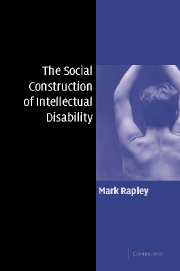Book contents
- Frontmatter
- Contents
- Acknowledgements
- A note on the cover illustration
- A note on transcription notation
- Introduction
- 1 A discursive psychological approach
- 2 Intellectual disability as diagnostic and social category
- 3 The interactional production of ‘dispositional’ characteristics: or why saying ‘yes’ to one's interrogators may be smart strategy
- 4 Matters of identity
- 5 Talk to dogs, infants and …
- 6 A deviant case (written with Alec McHoul)
- 7 Some tentative conclusions
- Appendices
- References
- Index
5 - Talk to dogs, infants and …
Published online by Cambridge University Press: 20 October 2009
- Frontmatter
- Contents
- Acknowledgements
- A note on the cover illustration
- A note on transcription notation
- Introduction
- 1 A discursive psychological approach
- 2 Intellectual disability as diagnostic and social category
- 3 The interactional production of ‘dispositional’ characteristics: or why saying ‘yes’ to one's interrogators may be smart strategy
- 4 Matters of identity
- 5 Talk to dogs, infants and …
- 6 A deviant case (written with Alec McHoul)
- 7 Some tentative conclusions
- Appendices
- References
- Index
Summary
Authority, that is to say, becomes ethical to the extent that it is exercised in the light of a knowledge of those who are its subjects … The exercise of authority, here, becomes a therapeutic matter: the most powerful way of acting upon the actions of others is to change the ways in which they will govern themselves.
(Rose, 1999a: np)But co-membership can be at stake, rather than presumed.
(Edwards, 1997: 295)This chapter examines data collected in community-based group homes for adults described as having moderate and mild intellectual disabilities. Review of sixty hours of videotaped interaction between staff and residents of the homes suggests, in line with the literature on staff–client interaction, three broad classes of staff behaviour which may – in order of their relative frequency – be glossed as: (1) babying/parenting; (2) instruction giving, and (3) collaboration/pedagogy. While such descriptions may be taken to imply that these are readily discriminable and categorically distinct genres of action this is not what is intended here. Rather these interactional styles shade into each other, and particular episodes of interaction may show evidence of aspects of more than one ‘style’.
- Type
- Chapter
- Information
- The Social Construction of Intellectual Disability , pp. 142 - 180Publisher: Cambridge University PressPrint publication year: 2004



